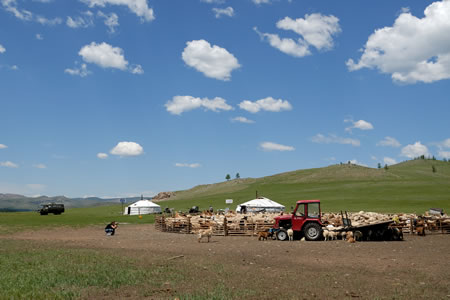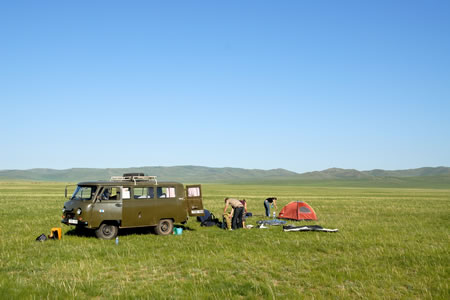English | Dutch |
|
| Eastern Mongolia: the domain of nomads and a drunken monk | |
Ulaan Baatar (Mongolia), July 8th 2010 |
|
Eastern Mongolia is for many tourists unknown territory. While most travellers go to the Gobi dessert and the northern and western part of the country, are we curious about the eastern part. Therefore, we leave Ulaan Baatar in northeast direction. We are travelling in our Furgon (Russian 4x4 minivan) that we named Vladimir. The landscape is superb. It looks like a kind of teletubbie landscape but more rough and with many wild flowers. The first evening, we are staying in a small wooden cabin on the place where Chinggis Khaan took the task upon himself to lead the Mongols. Afterwards, we go slowly southwards. Along the way, we visit several sights like monasteries, but in the end we are most attracted to the gorgeous landscapes and the nomad culture that you experience from up close. Mongolia is the least densely populated country in the world with only 2,8 million inhabitants in this enormous land. Half of its people live in Ulaan Baatar, and outside the city is the landscape vast en wild. You don’t see fences outside the villages and the area outside the dusty little towns is the domain of the nomads. Nomads travel on averages three times a year to another place where there is enough food and water for their livestock. They keep mainly sheep, goats, camels and horses. Because our driver isn’t familiar in this area, he goes to arbitrary gers (nomad tents) to ask for directions. Once at a ger, we are normally invited inside to drink Mongolian tea (hot milk, water, tea leaves and salt) and to eat dried yoghurt. Moreover, we can observe how they shave the sheep and train the race horses. In general, nomads live a simple life but they aren’t deprived of all luxury. They often have a jeep or truck and when the ger camp is close to a town they often have mobile phone coverage. With help of solar panels they have electricity and with help of a satellite dish they can even see the world cup football on their flat screen TV. |
|
 |
|
Asking for directions at a nomad family |
|
While driving towards Onderkhaan, Vladimir breaks down. We decide to pitch our tents, while the sun starts to set. Our guide prepares diner and the driver tries to revive the carburettor. Vodka seems to be sacred in this country, so after sprinkling a bit of this holy fluid on the windscreen of Vladimir, we hope that he will be fine the next morning. If it doesn’t help, it will certainly do no harm! The next day, Vladimir breaks down completely within a single kilometre. The spray devise in the carburettor is broken and we can’t get a spare one on short notice. There is no other choice than trying to arrange another Furgon. Together with Hogi (our guide) we walk to a nomad ger a few kilometres away, where they have mobile telephone coverage. While a new minivan is being arranged, we are being stuffed with Mongolian tea, dried yoghurt and freshly fried cookies. After a short while, an enormous platter with big humps of sheep meat is put in front of us on the ground. We take a few pieces and gnaw at the bones until they are clear of all meat. By this good habit, we show that the animal has died a useful death. Afterwards, a chartered van takes us to Onderkhaan while a Furgon drives from Ulaan Bataar to Onderkhaan to pick us up the next morning. The new minivan is baptised Alexander the Great, because we don’t think that the name Vladimir brought us a lot of luck. Our new driver (Ganzuk) likes talking to the nomads and sometimes we even don’t know whether he really wants to ask for directions or he just wants to know how the race horses of a certain ger camp are doing. Because of all this chatting, we see a lot of gers from the inside and we get a good impression of the nomad lifestyle. We visit a horserace that is held to prepare for Nadaam Festival. When horses do well on this festival, they can be sold for good money to the people of Ulaan Baatar. Childeren from between six and twelve years old are riding the horses. In the city, age limits are stricter but in the countryside they don’t care. The smaller and the lighter the horse boy or girl, the faster the horse. Children of three are already on a horse with their fathers, and at an age of four they can ride a horse by themselves. We are driving further towards Sainshand and everyday is another one to enjoy. We climb holy mountains and see a true ice cave while it is 40 degrees centigrade. Due to a lack of tourist gers and towns with a hotel, we often camp in the wild. Ganzuk also has to repair his car often, but is seems that he starts with repairing before something is completely broken down and more difficult to repair. When we are at a nomad family, he often offers his services to repair their jeeps of trucks. He likes the work and the chatting and we are getting food and a lot of fun in return. | |
 |
|
Camping in the wild is great in Mongolia |
|
| Near Sainshand, we want to visit a monastery that is famous because you can get a lot of “energy” over there. You have to do certain rituals after which you will be “reborn”. The monk, who will show us around the next day, is the strangest monk we have ever seen before. He works from 05:00 until 17:00 and after that time he dresses himself in his casual clothes to go to his wife and children. He drinks vodka in huge quantities and when he comes to pick us up the next morning, he really surprises us. Without asking, he walks into our ger and when we go inside afterwards to get our bags we notice that our bottle of vodka (with still a quarter of a bottle left) is empty. During our tour through the monastery, the vodka smell out of his mouth and his unstable walk are clear indications about who had a lot of after-thirst this morning! The monastery is special, but we will remember Sainshand as the place with the drunken monk. Near Sainshand they will remember us as the untalented singers that discovered the Karaoke Ger. Unfortunately for the local residents; gers don’t have good sound isolation. Therefore, our terrible version of “Beat It” from Michael Jackson could be heard for miles in the surroundings. There are luckily no windows inside gers because with our singing talents they could easily have been broken. Nevertheless, even afterwards we were still welcome at every ger for tea and some food. In eastern Mongolia hospitality even doesn’t end after sound terrorism! | |